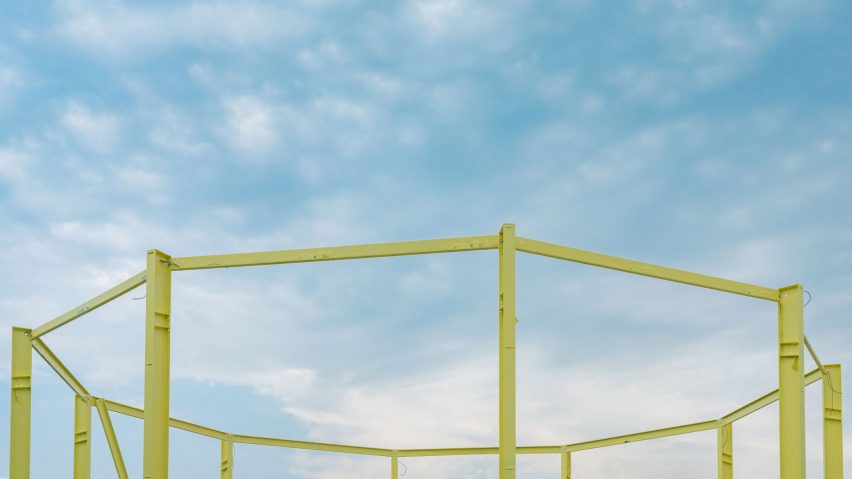Architecture studio Piovenefabi has created The Ring stage using repurposed steel beams for the 10th edition of Horst Arts and Music festival in Brussels.
Named Ring, the stage is the latest in a series of installation that have been designed to be adapted for public re-use added after the festival, which takes place in Asiat Park – a former military site in the Vilvoorde neighbourhood.
"The ambition was to leave something behind with a positive impact, rather than the often negative impact a festival has," Horst co-founder Mattias Staelens told Dezeen.
"We want to work with temporary architecture in a sustainable way by reusing materials, but also repurposing music stages for different functions and communities after."
Designed as this year's main stage, the eight-metre-high decagonal structure comprised of yellow-painted steel beams sourced from a deconstructed on-site structure.
Informed by circular design techniques, Piovenefabi intends for the structure to be repurposed as a multi-use sports and recreation area after the festival.
"The project salvaged the entirety of the structural elements from an existing structure and recomposed them into a new form," Piovenefabi co-founder Ambra Fabi told Dezeen.
"The steel beams taken were the only material used for the construction of the pavilion, except the yellow paint and some concrete foundations," she continued.
"Our yellow ring marks a permeable threshold, which defines an inside and an outside – you can decide to be in the centre, fully surrounded by lights and sound, or to stay outside."
Interspersed with a series of multi-level platforms angled towards the centre of the space, the open steel structure was designed to encourage interaction between festival-goers.
"The platforms surrounding the installation are podiums and ziggurats recreating a new landscape," said Fabi.
To transform the structure after the festival, floors will be repainted and basketball hoops and mirrors will be added to facilitate a range of recreational activities.
"The idea of transforming the Ring into a public sports ground after the festival came at the very beginning of the design process," said Fabi.
"The starting point was to imagine an object that could support both the festival elements and the leisure and playful activities," she continued.
"Once the play-sport ground is completed, the platforms will become tribunes and scenes for playful activities."
In previous years the re-use of installations was often unintended, demand has been made more integral to the design process, with members of the Horst team in touch with the local community throughout the year.
"Now we really want to start from the local needs and our link and involvement with the community so that it's right for them," Staelens explained.
Structures were designed and built by participants in Horst Atelier, an initiative that brings 40 young architects together with the designers to create new installations over a three-week period.
"Sustainable and re-use value is important, but another important principle is that structures can be built with non-professional builders," said Horst's Staelens.
Looking ahead to the end of the structure's lifespan, future deconstruction of the Ring was also taken into consideration.
"The Ring was made to be easily deconstructed – the most important thing to ensure re-use of materials is that it's non-glued and demountable," Staelens described.
"With wood and steel, you can screw and bolt and it's easy to do – we built most stages so you can take them down after without even knowing yet what you will use it for," he added.
Other festival installations recently featured on Dezeen include a series of fabric mushrooms for a Coachella stage by Do Lab and a pavilion made from salvaged timber and mycelium for Glastonbury 2023.
Photography is courtesy of Horst Arts and Music.

